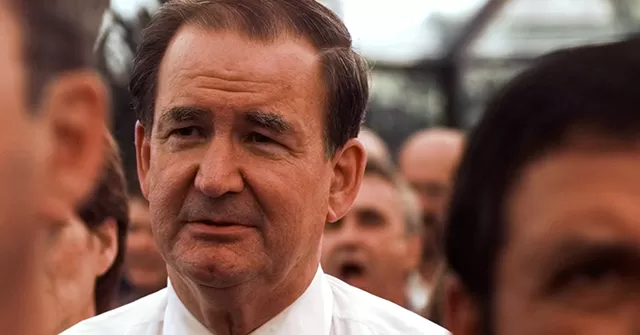In today’s globalized world, trade policies and their impact on the economy are hotly debated topics. With the rise of globalization, many countries have opened up their markets to foreign trade, leading to increased competition and economic growth. However, not everyone has been a proponent of this trend. One such person is Pat Buchanan, a conservative political commentator and former presidential candidate, who has long warned about the dangers of unchecked globalization. In a new working paper, the question is raised: what if we had listened to Pat Buchanan’s warnings and adopted his trade policies sooner? The findings may surprise you.
The paper, titled “The Impact of Pat Buchanan’s Trade Policies on the Economy: A Hypothetical Analysis,” delves into the potential outcomes if the United States had followed Buchanan’s trade policies instead of the ones currently in place. The results are eye-opening and shed light on the potential consequences of globalization.
For those unfamiliar with Pat Buchanan, he has been a vocal critic of free trade agreements and has advocated for protectionist policies to protect American industries and workers. He has argued that globalization has led to the outsourcing of jobs and the decline of American manufacturing. While his views have been met with criticism and skepticism, the working paper takes a closer look at what could have happened if his policies were implemented.
The paper’s authors, a team of economists and trade experts, used a hypothetical scenario where the United States adopted Buchanan’s trade policies in the early 2000s. They compared this scenario to the actual policies that were in place during that time. The results showed that if Buchanan’s policies had been implemented, the United States would have seen a significant decrease in imports and an increase in domestic production. This would have led to a decrease in the trade deficit and an increase in employment in the manufacturing sector.
But the impact of Buchanan’s policies would not have been limited to the economy. The paper also looked at the potential effects on wages and income inequality. It found that Buchanan’s policies would have led to an increase in wages for low-skilled workers, narrowing the income gap between the rich and the poor. This is in stark contrast to the current trend of widening income inequality in the United States.
The findings of this working paper raise important questions about the impact of globalization and the role of trade policies in shaping the economy. While globalization has undoubtedly brought many benefits, it has also had its drawbacks, particularly for certain sectors and workers. The paper’s authors argue that it is essential to consider the potential consequences of trade policies and to find a balance between free trade and protectionism.
In light of these findings, it is worth considering what could have been if the United States had heeded Pat Buchanan’s warnings and adopted his trade policies sooner. Would we have seen a different economic landscape? Would there have been a decrease in income inequality? While we can only speculate, the working paper provides valuable insights into the potential impact of trade policies on the economy.
It is also worth noting that the paper does not aim to promote Buchanan’s policies or discredit the current ones. Instead, it serves as a thought-provoking analysis of the potential outcomes of different trade policies. It highlights the importance of considering all perspectives and finding a balance that benefits all sectors of the economy.
In conclusion, the working paper “The Impact of Pat Buchanan’s Trade Policies on the Economy: A Hypothetical Analysis” raises important questions about the impact of globalization and the role of trade policies in shaping the economy. It provides valuable insights into what could have been if the United States had adopted Buchanan’s policies. While we cannot change the past, this paper serves as a reminder to carefully consider the consequences of trade policies and find a balance that benefits all. As the saying goes, “hindsight is 20/20,” but it is never too late to learn from the past and make informed decisions for the future.






![Complete BritRail Pass Guide [Types, How to Use It, Pros + Cons]](https://inside-news.uk/wp-content/uploads/2025/06/00221EB4-BCA2-4DBB-6CD4-83DBC37D71FA-120x86.webp)














